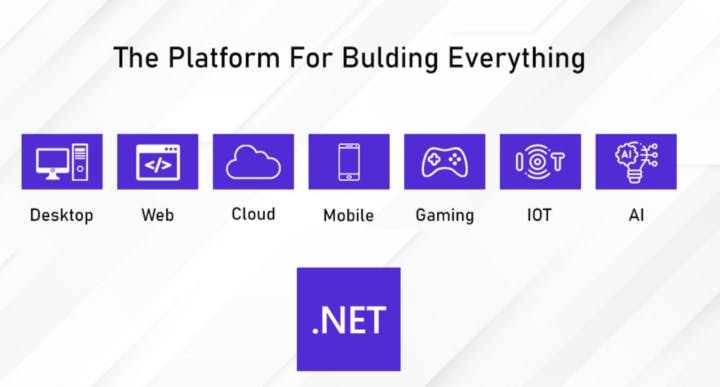Dedicated .NET Developers: Worse or Great for Your Business? 😲
The success of any project depends on how knowledgeable and skillful the .Net development team is whether it is an in-house or remote team. 🚀
The success of any project depends on how knowledgeable and skillful the .Net development team is whether it is an in-house or remote team. 🚀
The only thing you need to learn is when to hire dedicated .net developers and when to send the entire project to the .Net service providers.
In this post, I have covered every important aspect of when should you have to hire dedicated .NET developers that makes your project effective and successful.
Reasons Why .NET Rules the World of Web Development 🏆
1. Performance: .Net gives developers flexibility and scalability best suited for small to large projects.
2. Trusted & Secure: Built by top tech giant Microsoft and ensured by top-notch security.
3. Interoperability: .NET offers excellent interoperability and guarantees that security is not compromised in this process.
4. Productive: Modern language constructs like LINQ and asynchronous programming are available in .Net, allowing developers to develop high-quality apps quickly. It is paired with shared APIs, multilingual support, classic libraries, and the Visual Studio Family.
5. Platform Independence: .NET doesn’t restrict developers from building software products for any specific device or operating system.

When Should You Have To Hire Dedicated .NET Developers❓
The following is a list of the types of web projects/software that can be built using dedicated .NET developers:
Logistic web apps to facilitate the simplified creation of shipments and delivering goods at different locations.
Digital content management solution for sellers and buyers on a single platform.
Healthcare or medical apps for patient monitoring.
Additionally, the .NET framework is excellent for building mobile apps because it is compatible with every platform and works well with Android, Windows, and iOS operating systems. The Common Language Runtime (CLR) allows developers to write code in a variety of .NET languages, such as C#, C++/CLI, F#, and among other common intermediate languages.
You can hire dedicated resources to extend your team that works closely with your existing group if you need to speed up a current project, or if you need to upgrade or migrate your old .NET version to the latest one. Additionally, you may hire dedicated .NET resources to maintain and upgrade your website regularly.
Order management solution for Sales, Purchase, Shipping, Finance, Inventory, Manufacturing, and Ticketing.
Using .NET technology gives zero dependencies on external tools like Google Sheets, email, project management systems, and more. All these features are compiled on a single platform.

Business Startups, that required upgrading or mounting to .NET technology to build MVP and scale it. .NET framework can develop into a fully scalable and robust platform to account for business growth.
.NET technology is a very popular and most adopted technology for completely custom web projects. When you need completely customized software/apps for your business that are precisely tuned to your requests so that you get exactly what you want to meet your specific business needs. For this, you need to hire a dedicated .Net team of developers.
Cost of Hiring .NET Developer❓
For a thorough understanding of the cost to hire .Net developers, keep reading here —
bit.ly/3i1xzDG
10 Most Important .NET Developer Skills to Be Aware of Before Hiring

10/10 — Good at gathering requirements.
Any .NET development partner you choose to work with should not only be good at gathering and documenting your needs but also truly understand them. This means taking your requirements and translating them into programming logic that does what you need.
9/10 — Good User Interface Design skills.
The programmer should have UI skills and designing skills to be able to successfully marry the requirement and output together.
8/10 — Experience with JavaScript and all required front-end technologies.
A good .NET developer should also have the ability to work with JavaScript and even newer front-end technologies like React and Angular.
7/10 — Ability to interact with a database
They need to be able to write code to retrieve and store data in a database and to be able to create complex database queries on demand.
6/10 — A developer should be excellent at debugging and solving problems
This often requires detective-like skills, as well as the ability to debug and solve problems using the Visual Studio IDE (Integrated Development Environment).
Here are 5 more IMPORTANT things you must know —
bit.ly/3i1xzDG
What Kind of Web Apps Can be Built Using .NET Technology?
ASP.NET Web Applications: These programs that used to run on a web server handle user requests made over HTTP. ASP.NET web apps can range from simple websites that consist of HTML pages to advanced enterprise applications that run on local and remote networks. These enterprise applications also provide components for exchanging data using XML.
Web Services: These are “web callable” features that can be accessed by protocols like HTTP, XML, and SOAP.
Windows Applications: are form-based, industry-standard windows desktop applications for daily tasks. (For instance, Microsoft Word). Run only under Windows environment. These applications make use of the Windows operating system’s services.
Windows Services: These are long-running executable applications that run on the system in the background. The other processes that are running on the same computer are not hampered by these applications.
Read continue —
bit.ly/3i1xzDG
Wrap-up
By this point, you should have a good understanding of how and when to hire .NET developers, but you probably don’t know what mistakes to avoid when hiring .NET developers:
- Focusing only on technical skills and neglecting team dynamics and other soft skills.
- Choosing the lowest salary rates.
- Limiting your job search to a small number of generic sources.
- Relying only on community forums and freelancing platforms to hire a developer.
- Hiring without doing a comprehensive background check.
- Failing to conduct a proper tech interview.

